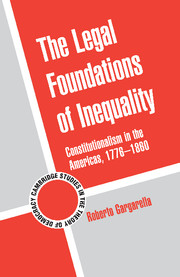Introduction
Published online by Cambridge University Press: 06 July 2010
Summary
Most constitutional democracies are in trouble: significant numbers of people do not trust their representatives and do not participate in party politics. Surveys reveal alarming figures on how citizens evaluate the worth and functioning of different public institutions and suggest a disconnection between what the citizenry wants and what the political decision-making process produces. Among the many factors that might explain this situation, one is undoubtedly the structure of the institutional system itself, as organized by its constitution. Many of the problems that we presently attribute to modern constitutional democracies are not unfortunate distortions of a properly organized institutional design but are the foreseeable effects of that framework. My aim in this book is not to overemphasize the role of our constitutional history in explaining future political events but rather to pay due regard to an important and often neglected topic.
Constitutional democracies, as we presently know them, were born after long revolutionary movements in defense of the community's independence or against aristocracy. These movements were profoundly egalitarian and expressed this egalitarianism in two basic dimensions. At the personal level, the revolutions claimed, and this was actually their main claim, that all men are created equal and that all have similar basic capacities. At the collective level, they claimed that the community should become self-governing; in other words, they maintained that neither a foreign country nor a particular family or group should rule the country in the name of the people at large.
- Type
- Chapter
- Information
- The Legal Foundations of InequalityConstitutionalism in the Americas, 1776–1860, pp. 1 - 8Publisher: Cambridge University PressPrint publication year: 2010

